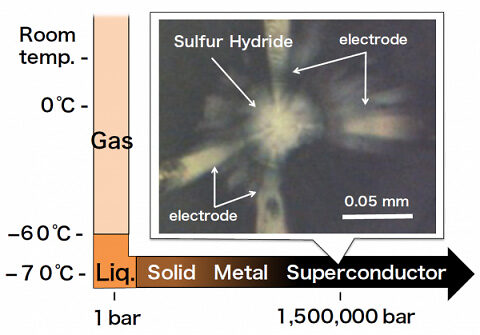200-K superconductivity in compressed hydrogen sulfide systems

Date
Location
Description
200-K superconductivity in compressed hydrogen sulfide systems
K. Shimizu1, M. Einaga1, M. Sakata1, H. Nakao1,
M. Eremets2, A. Drozdov2, I. Troyan2, N. Hirao3, Y. Ohishi3
1 KYOKUGEN, Grad. Sch. Eng. Sci., Osaka University,
2 Max Planck Institute for Chemistry, 3 JASRI / SPring-8
After finding superconductivity in 100 years ago, "room-temperature" superconductor has been long-fascinated target for physicists. Superconductivity above 200K was recently reported in the highly compressed hydrogen sulfide
(H2S) by Drozdov et al1.
The crystal structure of the superconducting sulfur hydride systems was studied by using the synchrotron x-ray diffraction at room temperature and the superconducting temperature. H2S and D2S were compressed to 150 GPa in DAC with same process with Drozdov et al1, and cooled down to 10 K in the cryostat in the x-ray diffractometer in SPring-8. The resistivity was monitored at all cooling
process. The critical temperature and zero resistivity were observed around 180 K, and the collected x-ray diffraction data showed good agreement with the theoretically predicted structures of R3m and Im-3m2. No structural difference was observed between at 10 K and room temperature.
The creation of the high-temperature superconductor was experimentally also confirmed by our Osaka group. H2S gas was cooled down to around 200 K and liquefied then compressed up to 150 GPa in a diamond-anvil cell (DAC). The resistance decreased with increasing pressure and showed metallic behavior in cooling process. The superconducting transition was observed at 60-70 K with
zero resistance. At the second cooling after warmed up to room temperature, the resistance dropped to zero from 180 K.
This work was supported by JSPS KAKENHI Grant Number 26000006 and
the European Research Council 2010-Advanced Grant 267777.
References
1. A. Drozdov et al., Nature 525 73 (2015).
2. D. Duan et al., Scientific Reports 4, 6968 (2014).
Subscribe to the OIST Calendar: Right-click to download, then open in your calendar application.



